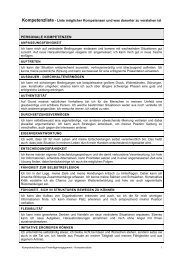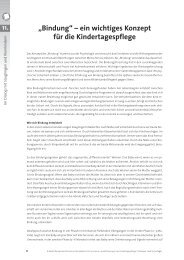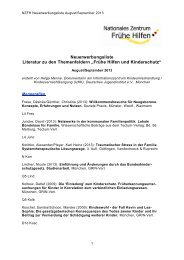download - Deutsches Jugendinstitut e.V.
download - Deutsches Jugendinstitut e.V.
download - Deutsches Jugendinstitut e.V.
Create successful ePaper yourself
Turn your PDF publications into a flip-book with our unique Google optimized e-Paper software.
LOS therefore principally addresses private persons as target groups. Due to the local<br />
level delegation of responsibility, local actors can decide which LOS target groups to focus<br />
on in the local action plan. This has produced a heterogeneous distribution of target groups<br />
in individual development areas. Generally, the primary LOS target groups included socially<br />
disadvantaged young persons, the long-term unemployed, re-settlers and immigrants,<br />
particularly women from these target groups. Single parents, those returning to<br />
employment and jobs, older employees, disabled persons, homeless persons, substance<br />
addicts and misdemeanants were less frequent LOS programme target groups.<br />
LOS did not entirely achieve its aim of reaching all employable age groups. The group<br />
of over-55s as a specific target groups were particularly addressed in only 64 micro-projects<br />
during the first three years, representing a figure of only 0.78 %. The majority of microprojects,<br />
almost 60 %, were planned to target participants from all age groups. A central<br />
LOS target group were young people under 25, targeted by the remaining 40 % of projects.<br />
The spectrum of LOS projects is wide. Projects aimed at individual persons offered the<br />
following range of operational fields:<br />
• projects for the gaining of professional qualifications<br />
• integration projects for the particularly disadvantaged, e.g. immigrants, longterm<br />
unemployed, etc.<br />
• encouragement of tolerance and democracy<br />
• targeted measures for early school leavers<br />
• business start-ups<br />
• job application training / coaching / career advice / profiling / assessment<br />
• professional orientation (including practical elements) / work experience<br />
• language courses / language training<br />
• qualifications (e.g. computer and media courses)<br />
• miscellaneous consultancy services<br />
• strengthening of key competences<br />
The LOS projects are for the most part so-called “advance measures” which are<br />
principally concerned with the orientation of disadvantaged persons towards the<br />
employment market in order to increase employability. LOS has however also had a not<br />
insubstantial effect on employment. A total of 7,852 additional job positions have been<br />
created and 4,239 socially disadvantaged young persons were successfully placed in<br />
apprentice training schemes, etc.<br />
An excellent example of LOS implementation is the development area Zech in the town<br />
of Lindau in Bavaria. One of the focal points of the programme in the urban area of<br />
Lindau-Zech is the support of young persons during the transition between school and<br />
their professional career. Project implementers work together with young people to<br />
develop their professional and social perspectives. Parallel to this, the young persons are<br />
able to work in so-called junior firms which offer payable services or products, e.g. within<br />
the areas wood, metal, catering etc, according to the professional orientation of the<br />
individual young persons. Following the culmination of their job, participants receive a<br />
final assessment, a work reference and if necessary further support in their placement<br />
within the ‘real’ employment market. Due to a comprehensive preparation for the world of<br />
73

















